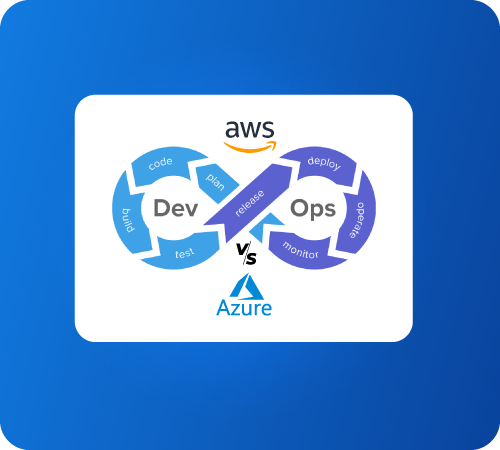In today’s fast-paced digital landscape, DevOps practices have become essential for organizations looking to streamline their development and operations processes. Two major players in the cloud DevOps space are Amazon Web Services (AWS) and Microsoft Azure. Both offer comprehensive DevOps toolsets, but each has unique features and strengths. In this blog, we’ll compare AWS DevOps and Azure DevOps to help you determine which platform is best suited for your needs.

Overview
AWS DevOps is a suite of services provided by Amazon Web Services to help you implement DevOps practices. It focuses on automating software development and delivery, enhancing collaboration, and improving deployment processes.
Azure DevOps is Microsoft’s integrated set of tools for managing software development projects. It supports the entire application lifecycle, from planning and development to delivery and operations.
Key Services
AWS DevOps
- AWS CodePipeline: Automates the build, test, and deploy phases of your release process.
- AWS CodeBuild: A fully managed build service that compiles source code, runs tests, and produces software packages.
- AWS CodeDeploy: Automates code deployments to any instance, including Amazon EC2 instances and on-premises servers.
- AWS CodeCommit: A source control service that hosts secure Git repositories.
- AWS CodeStar: Provides a unified user interface for managing your entire continuous delivery toolchain.
- Amazon CloudWatch: Monitoring and observability service for gaining insights into system performance and operational health.
- AWS Elastic Beanstalk: An easy-to-use service for deploying and scaling web applications and services.
Azure DevOps
- Azure Pipelines: A CI/CD service for building, testing, and deploying applications.
- Azure Repos: Provides Git repositories or Team Foundation Version Control (TFVC) for source control.
- Azure Boards: Agile tools for planning, tracking, and discussing work across teams.
- Azure Test Plans: Tools for manual and exploratory testing of applications.
- Azure Artifacts: A package management service to create, host, and share packages.
- Azure Monitor: Full-stack monitoring solution for insights into the performance and health of your applications.
Advantages
AWS DevOps
- Deep Integration: Seamlessly integrates with other AWS services, providing a unified cloud environment.
- Scalability: Automatically scales with your application needs, ensuring performance under varying loads.
- Security: Robust security features, including fine-grained access control and encryption.
- Global Reach: Extensive network of data centers globally, ensuring low latency and high availability.
Azure DevOps
- Integration with Microsoft Products: Seamless integration with Visual Studio, GitHub, and other Microsoft tools, providing a cohesive development environment.
- Cross-Platform Support: Supports development for various platforms, including Linux, macOS, and Windows.
- Comprehensive Toolset: Offers a wide range of services covering the entire DevOps lifecycle, from planning to monitoring.
- Extensibility: Extensive integration options with third-party tools, allowing customization to fit specific needs.
Use Cases
AWS DevOps
- Ideal for large enterprises leveraging multiple AWS services.
- Suitable for organizations with significant investments in the AWS ecosystem.
- Best for teams requiring extensive automation and scalability.
Azure DevOps
- Perfect for organizations using Microsoft products and services.
- Suitable for teams looking for an end-to-end DevOps solution.
- Best for enterprises requiring strong support for hybrid and multi-cloud environments.
Ease of Use
- AWS DevOps: May have a steeper learning curve, especially for teams new to AWS. However, its deep integration with other AWS services can streamline workflows once mastered.
- Azure DevOps: Generally considered more user-friendly, particularly for teams already familiar with Microsoft products. Its intuitive interface and comprehensive documentation make it easier to get started.
Pricing
- AWS DevOps: Operates on a pay-as-you-go model with pricing based on usage. This can be cost-effective for variable workloads but requires careful monitoring to avoid unexpected costs.
- Azure DevOps: Offers a free tier with basic services and charges for additional resources and services. This can be advantageous for small teams or projects with predictable resource needs.
Ecosystem
- AWS DevOps: Best for teams deeply integrated into the AWS ecosystem, leveraging its broad range of cloud services.
- Azure DevOps: Ideal for organizations using a mix of Microsoft and non-Microsoft technologies, providing flexibility and interoperability.
Conclusion
Choosing between AWS DevOps and Azure DevOps depends on your organization’s existing infrastructure, familiarity with the respective ecosystems, and specific project requirements. Both platforms offer robust and comprehensive tools for implementing DevOps practices effectively.
